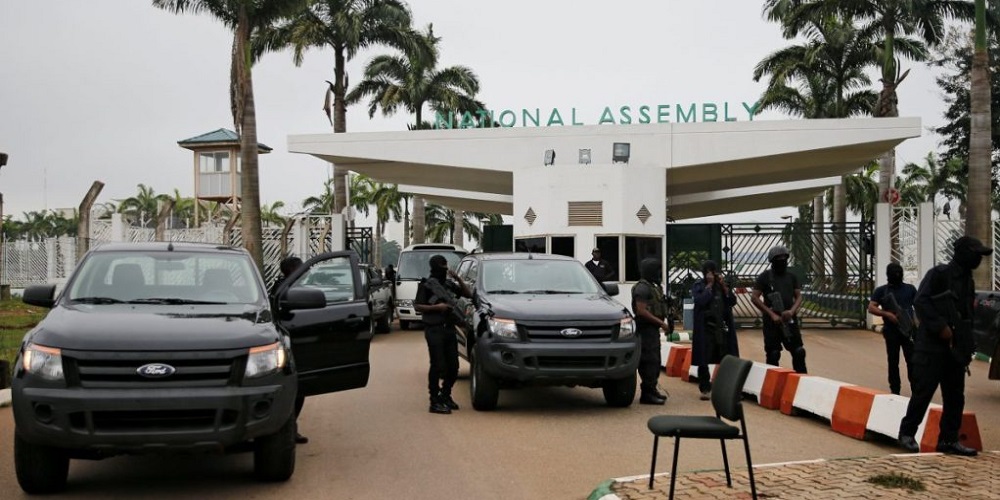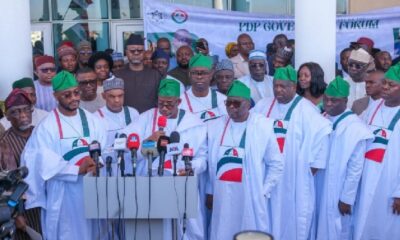News
Parliamentary workers reopen N’Assembly gates

National Assembly workers, under the Parliamentary Staff Association of Nigeria (PASAN), have opened the Assembly gates to allow lawmakers, staff, and visitors to access the complex.
The gates were opened on Tuesday afternoon following the news that the Nigeria Labour Congress(NLC) and Trade Union Congress had suspended (TUC) their strike for one week to allow for further negotiation with the Federal Government.
PASAN had locked the gates on Monday in solidarity with the NLC and TUC, who called the strike to push for a new minimum wage for workers in the country.
On Monday, the Secretary to the Government of the Federation, Senator George Akume led the Federal Government’s team to meet with the leadership of organised labour to continue negotiation on how to resolve the impasse.
During the meeting, the unions and the Federal Government signed a pact in which the government agreed to pay a higher amount than the N60,000.00 it previously offered.
The NLC and TUC had demanded a national minimum wage of N494,000.00 per month.
However, the government expressed concerns that this amount would stifle its ability to fund critical sectors of the economy such as education, defence, and healthcare, among others.
The strike which commenced on Monday was called to protest the failure of the Federal Government to approve new minimum wage by 31 May as well as its failure to reverse the hike in electricity tariff.
It was reported that after a six-hour meeting with the leadership of organised labour in Abuja on Monday night, the Federal Government expressed the commitment of President Bola Tinubu to raising the N60,000 offered as the minimum wage.
The agreement stated, “The President of Nigeria, Commander-in-Chief of the Armed Forces, is committed to establishing a National Minimum Wage higher than N60,000; and the Tripartite Committee will convene daily for the next week to finalise an agreeable National Minimum Wage.”
The organised labour also agreed to “immediately hold meetings of its organs to consider this new offer, and no worker would face victimisation as a consequence of participating in the industrial action.”
These resolutions were signed on behalf of the Federal Government by Minister of Information and National Orientation, Mohammed Idris, and Minister of State for Labour and Employment, NHon. keiruka Onyejeocha.
News
Rivers LG administrator cautions workers to avoid any form of negligence in their duties

The newly appointed administrator of Andoni Local Government Area of Rivers State, Mr Atajit Francis has warned staff of the council against negligence to duty.
Francis handed down the warning at Ngo, the council headquarters, shortly after resumption of duty.
The administrator who also met with the Head of the Local Government Administration said that the third tier of government requires diligence to deliver people-oriented services.
Francis further said that under his watch, underperformance and dereliction of duty would not be condoned.
He stated, “While we are on the saddle, we shall reward diligence and hard work. We urge staff to work towards achieving set goals.
“My mandate is specified, they include sanitation, environmental development, job creation, primary education and primary health care.
“The essence is to positively impact the lives of our people, knowing that the local government is the closest tier of government to the people.”
Insisting that transparency and integrity were critical to effective grassroots development and service delivery, he said, “So I expect all staff to uphold the highest ethical standards and accountability in the discharge of their duties.”
Recall that the Rivers State’s sole administrator, Vice Admiral Ibok-Ete Ibas (rtd) recently appointed administrators to oversee the affairs of the 23 local government councils in the state after he suspended the Heads of Local Government Administration appointment by Governor Siminalayi Fubara.
News
Newcastle thrash Crystal Palace to go third in Premier League

Newcastle soared up to third in the Premier League with a 5-0 thrashing of Crystal Palace on Wednesday to close in on a return to the Champions League next season.
Jacob Murphy, Harvey Barnes, Fabian Schar and Alexander Isak were on target for the Magpies, with Marc Guehi also scoring an own goal, as Newcastle made light of the absence of manager Eddie Howe due to pneumonia.
A sixth consecutive victory in all competitions opens up a five-point lead for Newcastle over sixth-placed Chelsea, with a place in the top five good enough for Champions League qualification.
Palace remain down in 12th with their season now fully focused on an FA Cup semi-final date with Aston Villa later this month.
Newcastle travel to Villa on Saturday in a huge clash in the battle for European places.
But the League Cup winners are pulling away from the chasing pack for a top-five finish, buoyed by ending their 70-year wait for domestic silverware last month.
“That gave us huge confidence,” said Newcastle assistant manager Jason Tindall, who is was deputising for Howe, of lifting the League Cup.
“We were able to enjoy that for a period of time but we knew what our objectives were for the remainder of the season – to finish as high up the league table as possible.
“The manager always leads and sets that example of never switching off. They’ve gone out there, been really consistent and delivering performances.”
Isak wasted two big early chances to open the scoring when he was firstly denied by a fine Dean Henderson save and then headed over from Murphy’s enticing cross.
Newcastle only had to wait until the 14th minute to open the scoring when Murphy blasted in a remarkable finish from a narrow angle.
– Eze fluffs penalty –
Palace were gifted the chance to get back into the game when goalkeeper Nick Pope rushed off his line and wiped out Chris Richards in his attempt to punch the ball clear.
After a lengthy VAR check, a penalty was finally awarded.
However, Eberechi Eze’s lackadaisical spot-kick was easily collected by the relieved Pope.
Within a minute, Newcastle had doubled their lead when Guehi turned into his own net as he attempted to block Barnes’ cross towards Isak.
The England defender has been regularly linked with a move to Tyneside and has now scored an own goal in each of Palace’s two meetings with Newcastle this season.
“There are some days where nothing works, and at the same time everything worked for Newcastle,” said Palace boss Oliver Glasner.
“We couldn’t deal with their intensity and directness and pace.”
It went from bad to worse for the visitors as Barnes continued his fine form with a composed finish for his fourth goal in three games.
Murphy’s free-kick was then flicked in by Schar to make it 4-0 before the break.
The normally lethal Isak continued to be frustrated in front of goal as Henderson spread himself to deny another effort from point-blank range early in the second half.
However, the Swedish striker finally got his 25th goal of the season with a fine finish from outside the area just before the hour mark.
News
Simon Ekpa engages new lawyer ahead of trial in Finland

Simon Ekpa, the controversial Biafra separatist, has appointed a new legal representative ahead of his upcoming trial in Finland scheduled for June 2025.
In November 2024, Ekpa, a self-proclaimed leader of the proscribed Indigenous People of Biafra, IPOB, was arrested by law enforcement in Finland.
He was subsequently sent to prison by the district court of Päijät-Häme for “spreading terrorist propaganda on social media.”
Ekpa was said to have committed the crime in 2021 in Lahti municipality.
He is accused of instigating violence and inciting terror in the South East of Nigeria through his social media pages.
Nigerian authorities have been demanding the extradition of Ekpa, a dual citizen of Finland and Nigeria, for prosecution.
However, the effort has been yielded the right result.
Last year, Mikko Laaksonen, the senior detective superintendent at the National Bureau of Investigation, NBI, in Finland, disclosed that a Finnish district court fixed May 2025 for the prosecution to file charges against Ekpa.
Subsequently, Laaksonen said Ekpa will remain in custody until his trial since the alleged offence is not bailable.
In March, Nigeria sanctions committee (NSC) designated Ekpa and 16 entities as alleged terrorism financiers in the country.
The committee also ordered the freezing of the bank accounts connected to the alleged terrorism financiers.
According to BBC Pidgin, Ekpa has changed his lawyer because the previous one had “retired from service.”
Kaarle Gummerus, Ekpa’s new lawyer, said he had received the pre-trial file of his client and he is “currently checking through.”
Gummerus added that Ekpa will appear in court in June 2025 to face trial.
-

 News16 hours ago
News16 hours agoPDP governors declare support for Tinubu
-

 News19 hours ago
News19 hours agoEx-finance minister rearrested in new fraud probe
-

 News17 hours ago
News17 hours agoHope for Nigerians as Dangote refinery slashes petrol price again
-

 News19 hours ago
News19 hours agoFubara: How can I forgive somebody who never requested for it– Wike
-

 News20 hours ago
News20 hours agoAlleged Se3ual Harassment: Natasha Declines Out-Of-Court Settlement Proposal By Akpabio’s Counsel
-

 News17 hours ago
News17 hours agoRivers Emergency Rule: Abbas inaugurates 21-member panel
-

 News16 hours ago
News16 hours agoN1.3trn CBEX Scam: EFCC caution Nigerians against Ponzi Schemes
-

 News18 hours ago
News18 hours agoPeter Obi asks president Tinubu to suspend France trip






